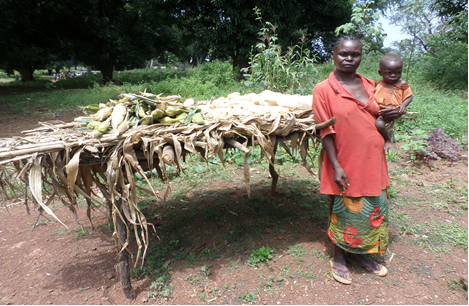
Jan. 2015—Nearly 1 million Central Africans have been displaced by sectarian clashes since 2013. The inability to earn an income, compounded by trade and harvest disruptions, has had a tremendously negative impact on the economy and people’s ability to meet their basic needs.
In 2013 alone, the Central African Republic’s (CAR) gross domestic product declined by 28 percent, the agriculture sector by 38 percent and livestock production by 55 percent compared to 2012.
When rebels attacked the town of Grimari in the central part of the country in 2014, Awa Hissen and her family had to flee, leaving everything behind. After traveling 50 miles east, they arrived in Bambari and took refuge in the compound of a mosque, along with thousands of other displaced people from various nearby locations.
Hissen and her family, like many others, fled their home to avoid the conflict, but ended up in a place where they had no means of sustaining their income.
Due to the sudden loss of income and supplies, the U.N. World Food Program (WFP), in partnership with USAID and other donors, distributed monthly food rations to more than 458,000 people in 2014. The food basket provided basics such as grains, beans and oil, as well as special nutritional products to prevent any spikes in malnutrition in children under 2.
Odette Kofedanga, a 46-year-old mother of eight, faced similar circumstances to Hissen. In September 2013, her village of Zere in western CAR was attacked by armed rebels. Kofedanga’s friends and neighbors were killed, 550 homes were burned and all means of earning an income were vandalized or taken away.
Kofedanga and her eight children managed to escape but had to hide in the bush for months. “We lived like animals,” she said. To provide for her family, Kofedanga collected wild yams or unprepared cassava leaves. Her children went hungry, and a few times did not eat for an entire day.
When the security situation in Zere stabilized, Kofedanga and her children returned to the village. By the following month, she was enrolled in the WFP food distribution program and her family received its first monthly ration of corn flour, beans, oil and salt.
While the rations addressed immediate needs, more than 260,000 farmers and their families still did not have the means to plant their crops in the upcoming planting season. In response, WFP enrolled farmers such as Kofedanga in a seed protection program so families could receive food rations at the same time they received seeds, tools and fertilizer through a U.N. Food and Agriculture Organization program. The food rations prevented families from selling off or eating the seeds to feed themselves so they could sustain their immediate needs and plant for the next harvest at the same time.
“If I had not received food from WFP, I would have eaten or sold the seeds I had received for planting, and would have had to search for other sources of income,” said Kofedanga. “The money I and others in my community have made from our crops that were planted will help rebuild and repair the village.”
Her harvest was smaller than normal, but she was able to harvest 50 kilograms of maize. By selling the maize, Kofedanga has been able to buy clothes and enroll her children in school. And her children now eat several times a day.
LINKS







Comment
Make a general inquiry or suggest an improvement.